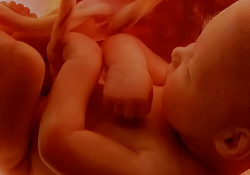Scientists say that babies can recognise faces even inside the womb. They found that 34-week-old foetuses turn their heads to look at face-like images when light is projected through the uterine wall of their mother. Scientists had also realised that it is possible for light to penetrate through human tissue and into the uterus, where a foetus could see it. According to some researchers, the findings are the first to show that it is possible to explore visual perception and cognition in babies before they are born.
"We have shown the foetus can distinguish between different shapes, preferring to track face-like over non- face-like shapes. This preference has been recognised in babies for many decades, but until now exploring foetal vision has not been attempted." said Vincent Reid of Lancaster University in the UK.
Reid added that technical barriers had prevented earlier studies of foetal vision and behaviour in the womb. The new study was made possible with high-quality 4D ultrasound.
The researchers tested the responses of 39 foetuses to face-like patterns of light presented to them in both upright and inverted orientations. The projected light moved across their field of vision while researchers watched the foetuses reactions using 4D ultrasound. Those ultrasound movies showed that the developing babies turned their heads to look more often at face-like stimuli that were upright than those that were presented to them upside down.
"There was the possibility that the foetus would find any shape interesting due to the novelty of the stimulus. If this was the case, we would have seen no difference in how they responded to the upright and upside-down versions of the stimuli. But it turned out that they responded in a way that was very similar to infants," said Reid.
The findings suggest that a baby’s preference for faces begins in the womb. There is no learning or experience after birth required. It also confirms that foetuses have enough light to see and have visual experiences in the womb.
However, Reid said that he warns and discourages pregnant mothers from shining bright lights into their bellies.

